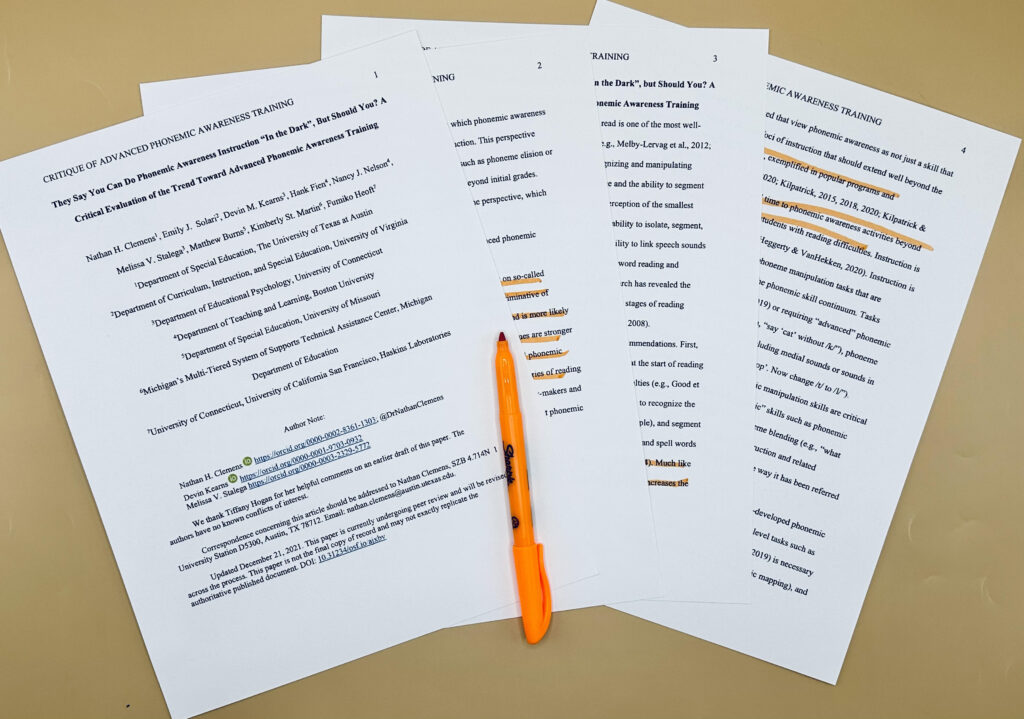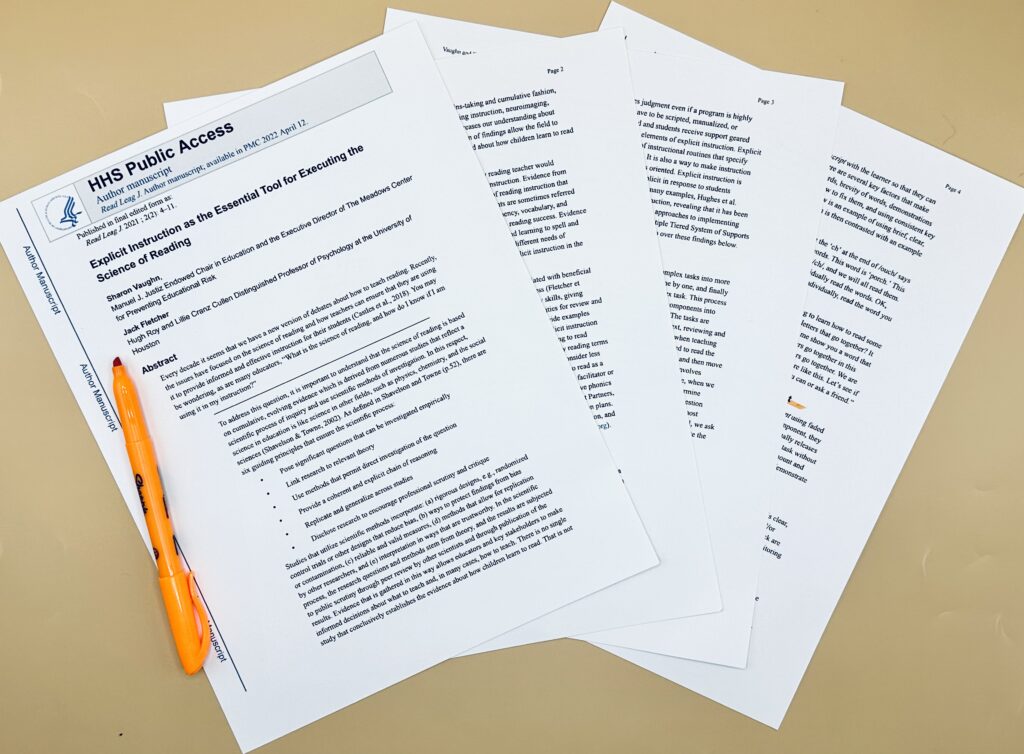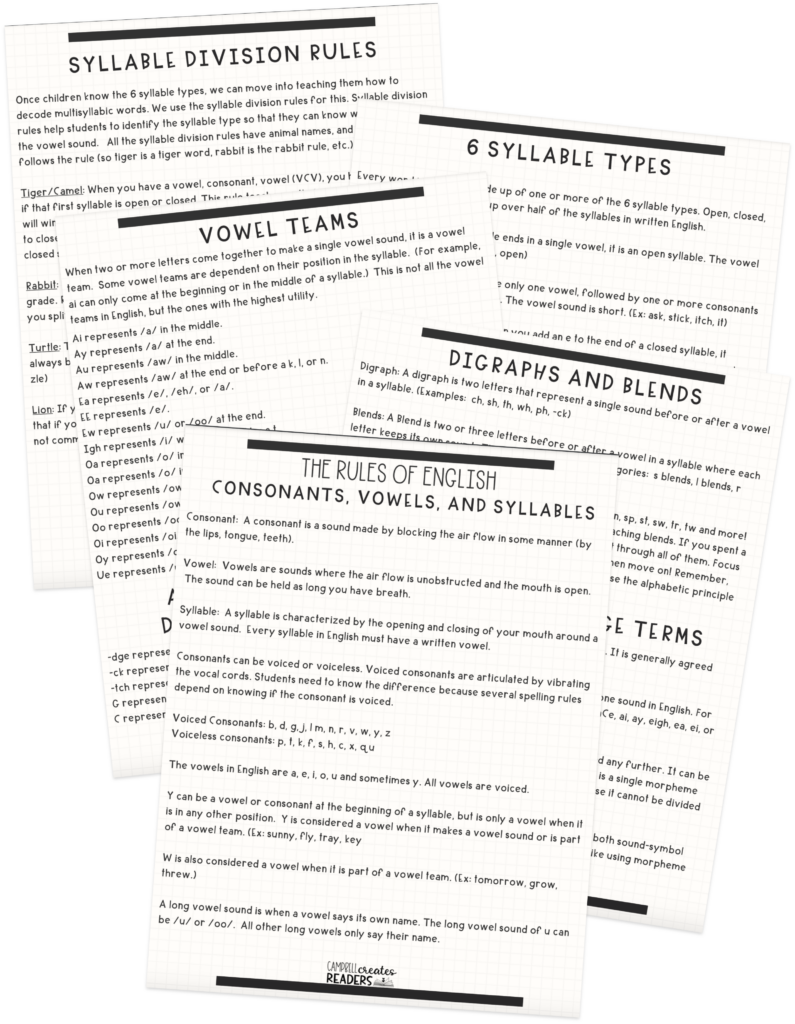
Share This:
Summer is the perfect time to pick up an article and to grow your understanding about what research suggests. This week, I wanted to share a variety of articles and research that have helped me grow as an educator. Most of them are easy to read, but the implications are huge!
This article is big, because it is one of the first real pieces of evidence that supports a knowledge-building curriculum. Natalie Wexler is the author of The Knowledge Gap, a book that literally changed my understanding of comprehension.
In this article for Forbes, she shares results of research that was released this year about the effect of a knowledge-building curriculum. She links the actual study in the article, but you can also just read her summary!

This study “involving more than 2,000 students has found that children who got a content-rich, knowledge-building curriculum for at least four years, beginning in kindergarten, significantly outperformed their peers on standardized reading comprehension tests. Students from low-income families made such dramatic gains that their performance on state tests equaled that of children from higher-income families”(Wexler, 2023). Friends, this is HUGE news. This evidence suggests that a focus on content and knowledge may be the best way to teach comprehension.
If you aren’t convinced in the need for a knowledge-building curriculum, or if you aren’t sure what it is, make sure you read this article!
When I first read this article, I felt attacked. I remember thinking “I just learned about phonemic awareness and now I’m learning that I did it wrong.” I literally had to remind myself that if I didn’t accept science, I wasn’t following the Science of Reading. And the authors of this have the research to back up their statements and claims.
This article explores two of the main debates around phonemic awareness instruction: should we include letters in our instruction, and do we need to teach advanced phonemic awareness skills? For a long time, we were taught that phonemic awareness instruction HAD to be done oral-only. Otherwise, it is a phonics activity.

But the truth is that utilizing a phonics activity (adding letters) can help promote an oral skill (phonemic awareness.) I have to be honest, after reading this paper I got upset, and then I changed my practices. I no longer worry about advanced phonemic awareness activities and spending 10 minutes of my precious time on phonemic awareness activities that are disconnected from print.
This article has freed up my time because it has allowed me to let go of some practices that were not serving my students as much as I had hoped.
Since starting my SOR journey, I knew that explicit instruction was critical. That being said, I didn’t exactly know all the components to it. I recognized that I needed to directly teach children and not let them guess their way towards a concept. But is that everything?

In this article, Vaughn and Fletcher examine and explain the 5 key components to effective explicit instruction. They include: segmenting complex skills into manageable tasks; modeling or thinking-aloud to address the important features of the content; promoting successful engagement using faded supports and prompts; providing feedback, and creating purposeful practice opportunities. If you want to learn more about the different components of explicit instruction, this article is gold. (It’s also not written in the very fancy language you find in many articles. This one didn’t make my brain hurt trying to get to he end!)
I specifically chose this article to read earlier in the year after Natalie Wexler referenced it in her speech at VSLA. I’ve always thought about comprehension globally and had never really given much thought about the role comprehension plays at the sentence level.
The authors state “We know that syntactic difficulties are a core feature in the profiles of children with specific language impairments, and we also know these children are at a high risk for long-lasting reading difficulties”(Scot and Balthazar, 2013, p.1). How many of us have ever really understood what syntactic difficulties are and how we can help our students with them!?! I know I certainly had not.

I enjoyed this article because it was written by two SLPs–so we know they understand syntax. It was not a research article, but more an article that explored different ways that sentence comprehension can fall apart, how you can identify it, and what you can do about it. They give us 3 high-leverage activities we can do with our students to help construct meaning at the sentence level, including sentence combining, paraphrasing, and including sentence-level, text-dependent questions.
The National Reading Panel is now 23 years old, and yet we are still referencing it. Why? Think about it like this: are we seeing new research about the damaging effects of smoking? Of course not! We know that smoking is damaging for our health. Likewise, some of the findings of this study are just accepted as fact, like the need for explicit phonics instruction.

We are also continuing to reference the National Reading Panel because we haven’t since had a government-funded initiative on such a massive scale. The National Reading Panel was not a small initiative to take on. Thousands of articles were looked at and many criteria had to be met before they were considered. An entire group of people that included stakeholders from different areas was involved in this process.
If you don’t feel like reading 400 pages of the National Reading Panel this summer, I don’t blame you. Instead, go ahead and look at my summary of the phonics, phonemic awareness, and fluency components of the National Reading Panel. I summarize the key components of both of these subsections so you can get he knowledge without the headache.
One area where we need some updating from the National Reading Panel is comprehension. This is a personal growth area of mine!
Before 2021, I probably hadn’t read an article since college. I’m realizing, though, that in a world where everyone has an opinion and shares it on all social media platforms, it is best to have science on your side. I started reading and sharing about article because of my belief that knowledge is power. The more I learn, the more equipped I become to weed through less-effective practices for the sake of my students. I hope this blog today has helped do the same for you. Happy reading friends!
Share This:

Savannah Campbell is a K-5 reading specialist. She has taught her entire 12-year teaching career at the school she went to as a child. She holds two master’s degrees in education from the College of William and Mary. Savannah is both Orton-Gillingham and LETRS trained. Her greatest hope in life is to allow all children to live the life they want by helping them to become literate individuals.

Savannah Campbell is a K-5 reading specialist. She has taught her entire 12-year teaching career at the school she went to as a child. She holds two master’s degrees in education from the College of William and Mary. Savannah is both Orton-Gillingham and LETRS trained. Her greatest hope in life is to allow all children to live the life they want by helping them to become literate individuals.
Feeling overwhelmed with all the terminology out there? Want to know the key terms all teachers need to teach phonics? In this FREE Rules of English cheat sheet, you get a 5 page pdf that takes you through the most important terms for understanding English—you’ll learn about digraphs, blends, syllable types, syllable divisions, and move. Grab today and take the stress out of your phonics prep!
